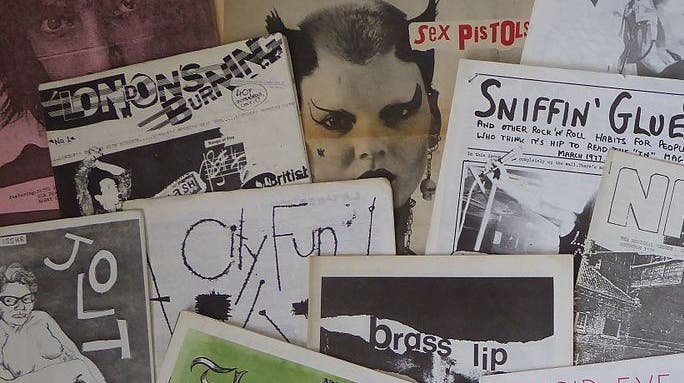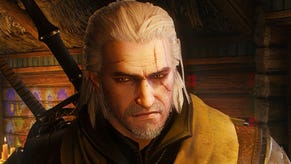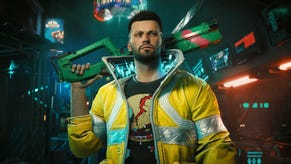Saving punk from Cyberpunk
How marginalised developers are reclaiming the term from AAA.
"How cyberpunk is Cyberpunk 2077?" is the question many of the game's detractors have been asking, often with reference to its handling of trans representation. The one I've been asking myself over the past few weeks is: how punk is Cyberpunk 2077? For that matter, how punk is cyberpunk full stop? The two share a moment in history but come from different places: punk is a distinctively angry and egalitarian music form, spawned in the 1970s and feeding into a much broader ethos of anti-capitalist and anti-authoritarian protest; cyberpunk, an outgrowth of New Wave sci-fi which explores, and revels in, what networked computing technology might bode for society and humanity. The origins of the term "cyberpunk" are hardly rock and roll: as Sam Greer recalls in a recent RPS piece on Cyberpunk 2077's trans politics, the writer Bruce Bethke coined it by stirring together words for "socially misdirected youth" with bits of tech jargon, in a "purely selfish and market-driven" act of editor-pleasing that would make a diehard punk spit blood.
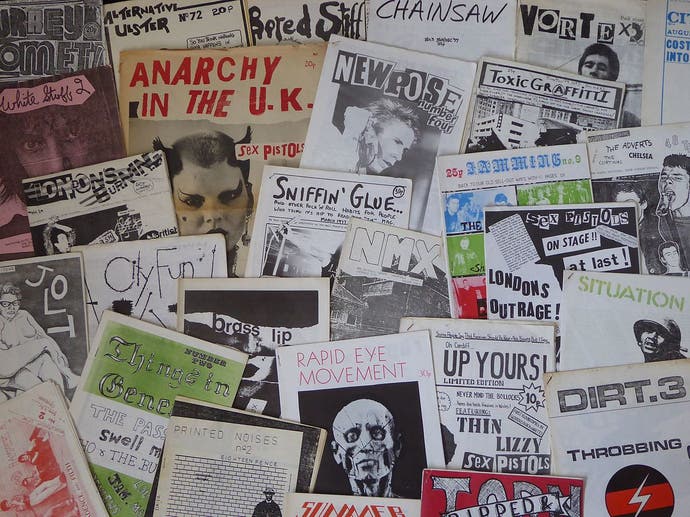
Still, the fact that one is the other's suffix is no incidental detail, and if cyberpunk began life as a snappy pitch, it has grown more radical in the hands of later generations as the technology it loves and fears has developed, and many of its prophecies about the associated risks and opportunities have become everyday concerns. Punk and cyberpunk today share a preoccupation with radical individuality and solidarity in the face of oppression in all its forms, be it surveillance through your smart appliances or the enforcing of destructive gender norms. Both are on some level about "constantly surprising people", in the words of Pussy Riot's Nadya Tolokonnikova, about seizing upon and recoding the categories and systems into which you are thrust, trampling hierarchies and running amok in the sanctums of the powerful. Each has its reactionary elements - there's a strong vein of macho chauvinism in old school punk rock, while cyberpunk's fondness for bad boy nerds saving the world through their laptops is not, to say the least, a good look in the age of 8chan - but both explore transgressiveness as a fundamental theme.
There's not a whole lot of transgressiveness thus far in Cyberpunk 2077. Instead, there are implants that make you a better fighter, infiltrator and hacker, branching dialogue paths, main and optional objectives, level-ups and a banquet of lavishly modelled weapons - all the customary fittings of an open world RPG, swimming beneath a crust of comfortably cyberpunk atmospheric cues such as chrome skinwear, overcompensatory neoslang and sexbots on billboards. It seems the game you'd expect from a publicly traded software company worth over two billion dollars, one that is, like Bethke, basically looking to combine known quantities in a flashy way rather than break things, and in that regard, of course, it's part of a very old cycle.
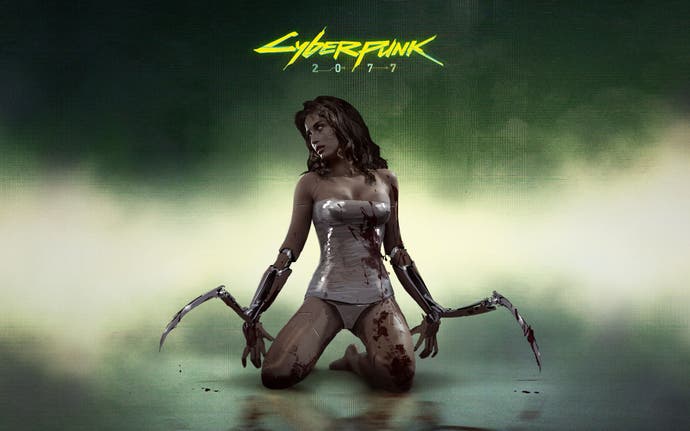
"Ultimately, what we see over and over is that people within dominant ideologies appropriate from these aesthetics and [their work] becomes the point of conversation in its stead," says Matilde Park, co-owner of Toronto, Canada-based studio Aether Interactive. "I think that happens all the time - look at cyberpunk. What does cyberpunk really mean to AAA corporations owned by other, bigger corporations making multimillion dollar fantasies within its aesthetics? Apparently, it means body modifications that don't change the body in any transgressive way; pervasive, overwhelming corporate dominance that is passively accepted as a fact of life. In a sense, when dominant ideologies appropriate the aesthetics of these movements, they're defanged, they're the same sort of narratives we see over and over. I think they're inherently less interesting stories, and I think that's why the movements begin to 'die.'" It's just as well, then, that there's more to videogame punk and cyberpunk than blockbuster games. Park and her colleagues are part of a cluster of developers - many of them queer, trans and indigenous people - who are learning from or embracing punk not just for its flavour but for the traditions and techniques it embodies.
If you're unfamiliar with Aether Interactive, now is the time to catch up: they're responsible for some of the most daring and profound narrative games of the past few years. Like much cyberpunk, Aether's games deal with the construction of consciousness, memory, identity and social relationships in a wired-up world, but they are among the few that manage to invest these explorations with a sense of adventure or peril. One of Aether's trademarks is that it casts you as a user, not a player, manipulating an in-game interface that has a tangible history. The recent Subserial Network appears as a set of pixelated, Netscape-style windows on your computer desktop, allowing you to exchange emails with characters and browse underground fansites as you comb a network for misbehaving synthetic lifeforms. Another staple is the characterisation of your involvement as an existential threat to the beings each game houses; they are stories about vulnerability in which the player's very agency is mistrusted rather than celebrated. Your putative role in LOCAL HOST, for example, is to wipe hard drives containing AIs that are notionally sentient, which involves assessing each program's claims to personhood in echo of the traumatic contestation of queer and trans identities online.
None of this is explicitly "punk", in Park's view, but it draws upon what she considers two key elements of punk culture. "A political and ideological thrust against dominant and hegemonic categories and institutions, and an inventive use of basic and inexpensive tools to make art." In this regard, Park feels there is "a huge overlap between punk and queer and marginalised creators. Queerness as an ideology is the collapse of category, it's taking and recontextualising roles and archetypes, it's making use of these symbols and semiotics to express one's identity and relation to others in a new way, one completely separate from the roles and life paths of the dominant heterosexuality." If "queerness, and especially trans experiences, are this inherent threat" to domineering ideologies, she goes on, then "punk is the voice of that threat" - it is a source of expressive practices queer people might wield to make space for themselves in a society that wants to deny their existence.
Moreover, while Aether's games are at odds with the anti-capitalist and anti-elitist sensibilities of much punk - they are "polished" products shaped by the studio's engagement with academia, a dominant institution - they embrace punk's much-sung DIY ethic in that they are made with tools anybody might use without much training. In this, they sit outside the forbidding blackbox of a game like Cyberpunk 2077, which glories in the free modding of technology by end users but is itself an inaccessible work of technology, replicable and modifiable only by a group with CD Projekt's resources (for more on the implications of such inaccessibility, I heartily recommend Tara Hillegeist's amazing essay on DOOMs old and new). "We're just queer and trans people using Twine," says Park. "All our games are Twine. Subserial is seven different Twine files communicating with each other and your computer. Sol Hemochroma is a Twine file shuffling images around with a Parallax library. These are inventive uses of basic tools, to amplify our voices - to signify a different kind of storytelling, a different way of life."

If you're after a variety of gamepunk that skews closer to the riotous lyrics of a band like Crass, look no further than the work of Heather Robertson, the Los-Angeles-based creator of serial adventure EXTREME MEATPUNKS FOREVER. The game is a six-part tale of four "gay disasters" making their way through an America in which everybody drives a robot made of bone and muscle, the sun is dead and hell has become a timezone. Its wiry sense of humour aside, MEATPUNKS is notable for its bashed-up makeshift art, with scenes drawn up using ASCI symbols and attacks manifest as scratchy 2D arcs, as though each fighter were trying to claw the other off the screen.
"Punk is by and for people who find themselves outcasts of society, who are told they're not good enough because of who they love, or the colour of their skin, or their gender identity, or any number of things," Robertson tells me. "Punk is a celebration of survival under oppression: raw, white-knuckled, scarred, furious, and always ready for the next fight. Also, punk is about beating the hell out of neonazis." The game is, amongst other things, an indelicate riposte to the idea of "debating" fascists and so, legitimising their views - "no-platforming" the far right here means literally booting them off a cliff. All of this is "directly inspired by DIY punk aesthetics and politics," Robertson goes on. "It's gritty and messy and weird, and perhaps the most unsubtle thing I've ever made - it will tell you exactly what it means, and it will tell you it angrily. It's a game about survival, about building a community with other rejects from society, about finding moments of solace even as you see everything fall apart."
Robertson's games are necessarily, but artfully, straightforward of design; as with the cut-and-pasted punk zines of the 1970s and 80s, the idea is that anybody can pick up where she left off. "I create ASCII art with Notepad, visual art with Gimp 2, program in Sublime, do sound work in Audacity, and assemble it all in Unity. I picked up ASCII art and the very little I know about sound design through concentrated study and practice, working with perspective, etc to gain specific skills. An important thing to note is that all these tools I mentioned are free. This may partially be because I don't have a lot of money to spend on expensive software, but I also really like the idea of being able to show someone something I made and tell them that, without spending a dime, they could make something of the same quality or better. Probably better."
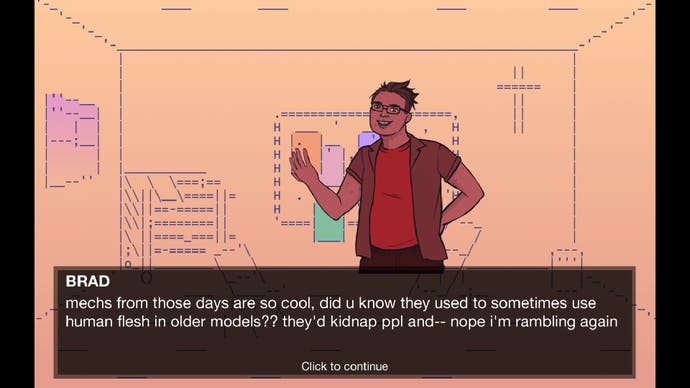
For the Toronto-based gamemaker and artist Gabriela Aveiro-Ojeda, punk is not a modern concept but only a recent manifestation of traditions of resistance centuries in the making - traditions we ignore and overwrite if we limit the definition of punk to the work of Caucasian artists in the late 20th century. "Many concepts and ways of expression have been around for much longer than we've known them," they tell me. "This extends to gender, bodies, and technology. We like to think of punk (and its iterations) as something brand new or revolutionary, but punk doesn't need to be something new to be a valid method of challenging the systems we live in."
Aveiro-Ojeda calls attention to how "various indigenous nations (including the one part of my family comes from, Guarani) [...] have resisted and continue to resist colonialism by tapping into spiritual traditions, while also finding new ways to contextualize culture in a colonialist society." They observe that "to be anti-colonialist is to be punk, and punk tends to almost never focus on how much of its concepts it owes to indigenous resistance". Similarly, cyberpunk's obsession with the utopic and dystopic promise of late capitalism's gadgets disregards the imaginative and political potential of older and enduring technologies and conceptions of technology. "I think it's very silly when indigenous culture and technology is classified as outdated, when indigenous technology has sustained communities for thousands of years, while our 'modern' technology is easily replaced and is not made in a sustainable manner."
Aveiro-Ojeda tackles all this head-on in their Twine game 1870: CYBERPUNK FOREVER, which unfolds in the past "to drive home the idea that being punk or cyberpunk is not a thing of the future". The game also breaks from the idea that cyberpunk is fundamentally a genre of the city, rising in sordid resplendence over the data-saturated and neurally networked bodies of the dispossessed. You begin it as a cyborg on the edge of one such city, the Hub, and follow an exposed cable to a village of cyborgs who have their own understanding of what being a cyborg entails.
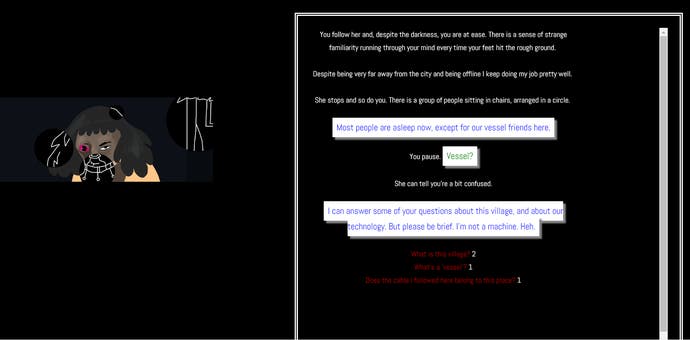
In the process, you are asked to reckon with what you bring with you. The game is narrated by the AI core buried in your character's skull, which refers to the player as "you" and itself as "me", and attempts throughout to classify your perceptions, highlighting keywords in red and grading dialogue responses according to a "suspicion" index. Where a game like Deus Ex regards such implants as unproblematic extensions of the player's will - in effect, superpowers with which to better navigate an environment that only appears unreceptive, but is in fact designed to be jailbroken - here you are made to wrestle with the idea that your AI's interventions are domineering and self-defeating, a forcing of the city's logic upon bodies and identities that refuse to be so interpreted.
It's a dismantling of the colonising tendency that aims to pre-define life beyond the metropolis, hollowing it out in the process of "discovering" it, which also interrogates how a colonialist worldview might inform the concept of gender. "The only gendered assumption we have comes from the main character's AI assigning one cyborg female characteristics and the other cyborg male characteristics, when they do not reference themselves with gendered terms," Aveiro-Ojeda points out. "Especially in a culture like Guarani, language and social roles are for the most-part non-gendered and it's something that has extended, or that I've tried to work into, my work."
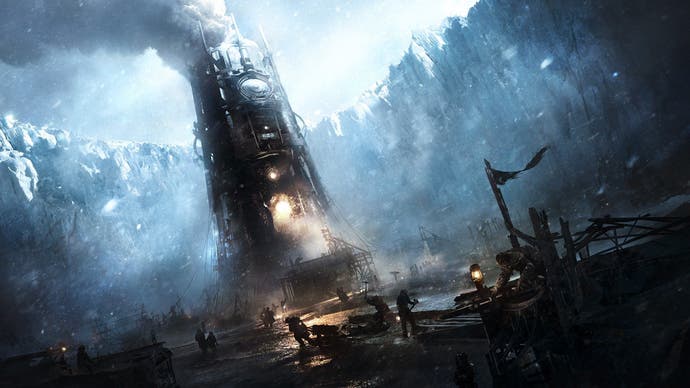
The power of punk as a political artform derives partly from the fact that "punk" was once a term of abuse. In its present incarnation, it is a word rescued from centuries of dehumanising violence - a survivor, much like those who now call upon it as a mode of resistance. Asked to explain the title of icelocked management sim Frostpunk, 11 bit's creative director Michal Drozdowski points not just to punk literature and music but the 17th century sense of "punk" as a kind of decayed wood, commonly used as tinder - something fit only to burn. It's a useful reference point for a game that hinges on one final, desperate act of combustion, in which you sacrifice the bodily energies of sickly exiles to a coal-fired generator, stretched across the HUD like a gunsight. And it feeds into a history of English usages that grow steadily more malevolent, the nearer you come to the present day.
By the end of the 19th century, punk had acquired a decided social inflection, meaning not just something "poor, second-rate, inferior" but "a contemptible person". It was and, in many quarters, remains a term with which to belittle and break down the already-broken: per the OED, the noun's still-active senses include thug, hoodlum, coward, weakling, prostitute and rape victim. But that older association with kindling a blaze also speaks to punk's appropriation and reinvigoration by the marginalised - a spirit Frostpunk channels and pays tribute to, as it pits the last remaining humans against an Earth that no longer cares for them. "The cataclysm has brought the people in the game to the brink of destruction, wiping out their whole civilisation," Drozdowski goes on. "These people are somehow deemed worthless by nature, but in reality they're not - they show how great their strength can be."
